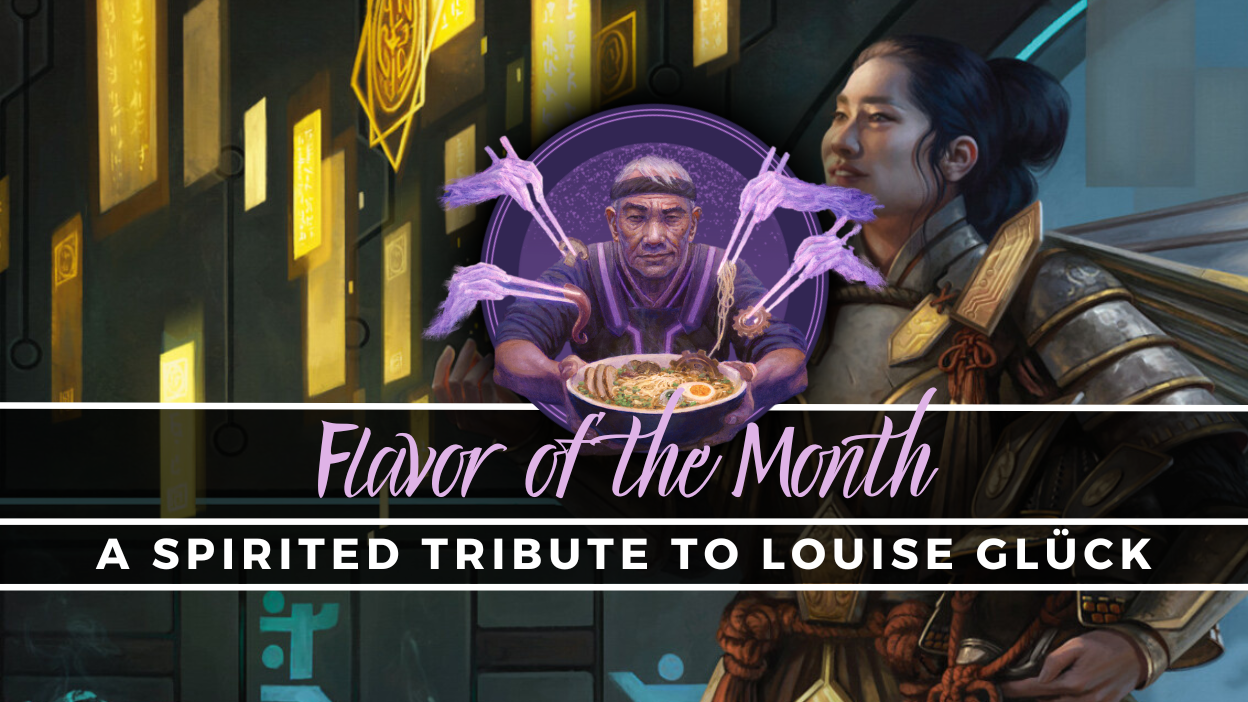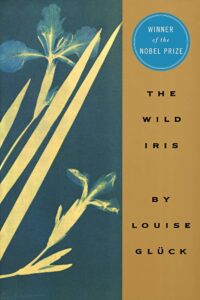Flavor of the Month: A Spirited Tribute to Louise Glück

Constituting the Field
Welcome to Flavor of the Month, where we use cards' flavor as a recipe for building decks! Today, we're going to go even farther afield than we usually do. In this column, we've built decks based on an in-universe text, a classic comedy movie, as a paean to two characters' love, on an overarching theme, or even centered around a real-world author's work that was directly added onto Magic cards back when they used to do that. Today, we're going to dedicate the deck to the memory of a great artist.
Generally, when flavor text gets added to Magic cards, they're written to fit the card's mechanics and/or art. We're going to do the opposite today and find cards whose functions or art fit the text. In this case, the text isn't already-printed flavor text, but rather the work of the Nobel Prize-winning poet who passed away in October, Louise Glück.

Ingredients
You may be wondering: what does a poet, who wasn't even featured on any cards (like Shakespeare or Edgar Allan Poe in early expansions of the game), have to do with Magic: The Gathering, or deckbuilding, or EDH? Well, poetry, and art in general, is important to me. Art is, of course, important to a lot of people. Other fields may help us navigate the "how" of life--medicine, technology, agriculture--but art helps us understand the "why," whatever that means to each of us individually. It offers us moments of beauty, realization, and communion; it deepens our connection to the world, and by extension, the people within it.
Art is expression, curiosity, creativity... and so is the building of a Magic deck! At its best, Magic and Commander can function as a prism through which we bring ourselves to the world: through the act of selecting the cards and interactions we want, down to the actions we choose and the arts/styles we go with when sleeving up, there is an incredible wealth of ourselves that we put into this game. Magic has been an incredible creative outlet for me, as has poetry, and I owe aspects of my creative life to many people, maybe none more so than Louise Glück.
We all have inspirations in our lives. Maybe someone inspired you to take the first steps toward your current career, or a family member or friend who inspires you to live up to their example. Even seeing a popular content creator build a deck that looks like fun and makes you want to brew your own is a form of inspiration. For my writing life, Louise Glück has been the foremost driving force pushing me to develop my voice, though of course there are many, many other influences, as we should all aim to read widely, but Glück always stood out to me, and I use the term "voice" purposefully-: one of the most immediate impacts of reading Glück's work was being struck by her otherworldly, effortless command of voice. Bby voice, I mean the hard-to-describe quality of the "speaker" in a work, the bits of personality and choice that seep through their words.
If you have even the barest shred of interest in or curiosity about poetry--and I have to assume you do if you're still reading this far--do yourself a favor and check out Glück's books. She's got something for everyone: she can be wickedly smart, honest, bleak, tender, and funny, sometimes within the span of a single line. For those that like their poetry dramatic, you're in the right place; she's a lyric poet of the highest order, one concerned with "betrayal, mortality, love and the sense of loss that accompanies it," according to fellow poet Don Bogen. "She is at heart the poet of a fallen world."
One of her best books, Averno--which is the name of the crater lake ten miles west of Naples that ancient Romans believed to be the entrance to the underworld--begins its titular poem with the lines,
You die when your spirit dies.
Otherwise, you live.
You may not do a good job of it, but you go on --
something you have no choice about.
How's that for stakes? Glück's poise and aim are masterful, so much so that she made a book full of poems in the voices of flowers, a gardener, and God, which, based on that description alone, sounds like it would be the most kitschy, fluffy, and blah work imaginable, into a metal, hard-punching, blistering masterwork that won her the Pulitzer Prize. Like, how's this for the voice of witchgrass:
I don't need your praise
to survive. I was here first,
before you were here, before
you ever planted a garden.
And I'll be here when only the sun and moon
are left, and the sea, and the wide field.
I will constitute the field.
The book I'm referring to is The Wild Iris, which is where we're focusing today. More specifically, we'll be looking at a poem from the book, which shares its title with the book itself, line by line. We'll take a line or two and translate it through our choice of cards that can represent those words. By the end of the poem, we'll have a small collection of cards, which will be the foundation we build the rest of the deck around.

Preparation
The Wild Iris takes the form of a series of persona poems--that is, poems from the perspective of someone other than the author--which rotate between a gardener speaking to the garden, the flowers and plants in and around the garden throughout the seasons, and, essentially, a God looking down on the others. The gardener is probably the closest one to the poet themselves, but as any artist will confirm, there's a little bit of Glück somewhere in all the voices she inhabits.
This poem, the title poem of the collection, is in the voice of a wild iris flower--and is about... well, you'll see. Let's read the poem line by line, then find the cards to match it. We'll show the cards directly below the line they're representing.
The Wild Iris, by Louise Glück
At the end of my suffering,
there was a door.
Hear me out: that which you call death
I remember.
Overhead, noises, branches of the pine shifting.
Then nothing.
The weak sun
flickered over the dry surface.
It is terrible to survive
as consciousness
buried in the dark earth.
Then it was over: that which you fear, being
a soul and unable
to speak, ending abruptly,
the stiff earth
bending a little. And what I took to be
birds darting in low shrubs.
You who do not remember
passage from the other world
I tell you I could speak again:
whatever returns from oblivion returns
to find a voice:
from the center of my life
came a great fountain,
deep blue
shadows on azure seawater.
Yield
What we have here, besides a beautiful poem grappling with consciousness, life, permanence (and its lack), and much more, is the stirrings of a workable Commander deck.
We have a Spirits deck that wants to fill the graveyard with its kind, then bring them back, fitting with the cycles of death and rebirth tackled by the poem. Iname, Life Aspect and Iname, Death Aspect are a great, flavorful pair that can achieve a lot on their own. Here, we're talking Spirits less in the spooky Innistrad sense and more of the Kami sense, the life force of nature; many of the poems in this book are in the voices of flowers, after all.
We have Ravos, Soultender and Kodama of the East Tree (plus a few more of the Kodamas) leading the deck, allowing us to bring creatures back from the dead and do so while still developing the board efficiently. We have a few Angels to support the resurrection theme; they're also are a nice representation of the divine voice in other poems in the collection. Plus, a surprising number of Angels make or work with Spirits: see Luminous Angel, Requiem Angel, and Angel of Flight Alabaster.
A number of Arcane spells fill out many of our utility slots, since they play well with Spirits (see Elder Pine of Jukai, Petalmane Baku, or Loam Dweller). This is why we have Kodama's Reach instead of Cultivate, Wear Away as our Disenchant of choice, and so on. We also have, naturally, a land subtheme, and ways to bring those lands back to life with multiple Crucible of Worlds effects and many lands you can sacrifice, whether for mana-fixing (a la fetchlands, like Marsh Flats) or value (Horizon Canopy).
Here's the full list:
I hope you enjoyed this offbeat approach to deckbuilding and this introduction to (or reflection on, if this is not the first time you've heard of Louise Glück's work) an incredible artist. Tell me in the comments below what you thought about this one and if you'd like me to do more of these articles that basically reverse-engineer flavor text or take a deep dive into topics and individuals!
Thanks, as always, for reading; and Louise, thank you for writing.
